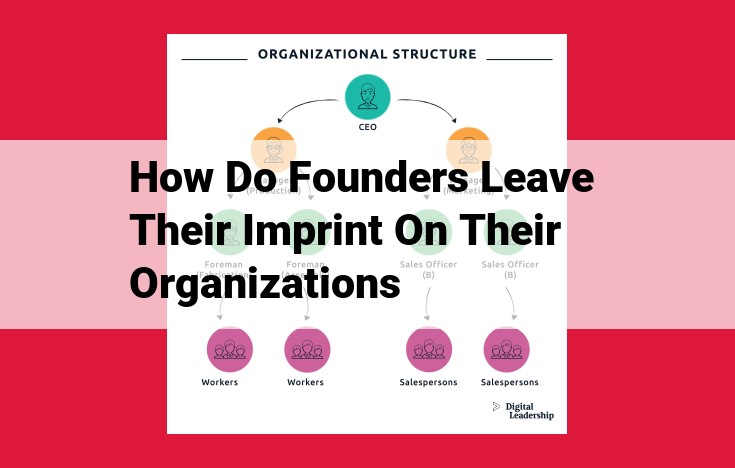Founders leave a lasting imprint on their organizations through their vision, values, and culture. They establish guiding principles that shape the workplace environment, inspire employees, and foster innovation. The legacy of founders includes their passion, aspirations, and leadership style, which continue to influence the organization’s strategy, direction, and ongoing success. Preserving their legacy ensures that their contributions and values remain ingrained in the organization’s DNA.
Founders’ Vision and Values: The Cornerstone of Organizational Culture
The foundation of any successful organization lies in its guiding principles, beliefs, and aspirations. These are the cornerstones upon which the organization is built and that shape its culture and identity. It is the founders who play a pivotal role in establishing these foundational values, which ultimately determine the organization’s trajectory and legacy.
Founders bring their unique visions and aspirations to the table, which serve as the compass for the organization’s journey. These visions are often rooted in personal experiences, beliefs, and values that the founders hold dear. They envision a better future, a world where their organization makes a meaningful impact. These aspirations, whether altruistic or entrepreneurial, drive the mission and purpose of the organization.
The founders’ beliefs about people, leadership, and success also play a crucial role in shaping the organization’s culture. If they believe in collaboration, the organization will be team-oriented. If they value innovation, the culture will foster risk-taking and experimentation. These beliefs translate into organizational values, which become the guiding principles for employees at all levels.
The founders’ legacy is inextricably linked to the values they establish. These values become embedded in the organization’s DNA and serve as the moral compass for decision-making. They guide the organization’s interactions with stakeholders, resource allocation, and strategic initiatives. By living the values they espouse, founders inspire and motivate employees to do the same, creating a positive and productive work environment.
Organizational Culture and Values: Shaping the Workplace Environment
Every organization’s culture is a tapestry woven with threads of shared values, norms, and behaviors. These threads are often spun from the vision and ideals of the organization’s founders.
Founders’ Influence on Organizational Culture
The founders of an organization play a pivotal role in shaping its culture. Their aspirations, beliefs, and personal experiences leave an indelible mark on the fledgling organization. They establish the guiding principles that will steer the organization’s ship through stormy seas and calm waters alike.
Culture’s Impact on Workplace Environment
Once established, the organization’s culture permeates every aspect of the workplace environment. It influences employee behavior, decision-making, and even the way they interact with customers and colleagues. A culture of innovation and risk-taking encourages employees to push boundaries and embrace new ideas. Conversely, a culture of conservatism may stifle creativity and innovation.
Values-Driven Decision-Making
The founders’ values often serve as the compass for the organization’s decision-making. When faced with ethical dilemmas or strategic choices, organizations look to their founding principles for guidance. This values-based decision-making helps maintain consistency and preserve the founders’ legacy.
Preserving the Founders’ Values
Maintaining the founders’ values over time is crucial for preserving their legacy. Commemorating their contributions and celebrating their vision helps instill a sense of pride and purpose within the organization. Continuous reinforcement through training, communication, and leadership modeling ensures that the founders’ values remain deeply ingrained in the organization’s DNA.
Founders’ Motivation and Aspirations: The Driving Force Behind Organizational Success
Every organization has a story, and at the heart of that story are the founders. Their aspirations and personal motivations not only shape the initial character of the company but also serve as a guiding light throughout its journey.
Each founder brings their own unique set of goals and beliefs into the business, which inevitably influences its mission, strategy, and direction. Some founders may be driven by a desire to solve a problem they’ve faced firsthand, while others may be motivated by the potential to create something truly original.
The founders’ aspirations are often deeply intertwined with their personal values. For example, a founder driven by a strong sense of social responsibility may prioritize sustainability and community involvement in their business operations. Conversely, a founder with a competitive spirit may focus on growth and market dominance.
Beyond their personal motivations, founders may also be influenced by external factors, such as the industry landscape, technological advancements, and customer needs. By carefully considering these factors and aligning them with their own aspirations, founders can create a powerful vision that serves as a roadmap for the company’s future.
The founder’s role in setting the tone for the organization’s culture cannot be overstated. Their enthusiasm, determination, and unwavering belief in their vision inspire employees to embrace the same values and work towards the same goals. By sharing their personal stories and motivations, founders create a sense of connection and purpose that fosters employee engagement and loyalty.
As the company grows and evolves, the founders’ aspirations and motivations may shift, but their legacy remains. The principles they establish and the culture they create continue to influence the organization’s decision-making and behavior. By understanding the motivations of the founders, we gain insight into the very essence of the company and its potential for long-term success.
The Enduring Legacy of Founders: Shaping Organizational Success and Reputation
The imprint of founders on an organization extends far beyond the founding years. Their vision, values, and leadership style become the bedrock upon which the company’s success and reputation are built.
The vision of the founders serves as a guiding light, inspiring employees and stakeholders alike. Steve Jobs’s vision of a world where computers were accessible and personal propelled Apple to become one of the most innovative companies in history.
Similarly, founding values establish the ethical and behavioral compass for the organization. Patagonia’s commitment to environmental sustainability has not only shaped its product development but also attracted customers who share its values.
Leadership style plays a crucial role in shaping organizational culture. Elon Musk’s bold and risk-taking approach has driven Tesla’s rapid growth and disruption of the automotive industry.
The legacy of founders extends beyond their presence within the company. Their values and principles continue to guide decision-making, influence strategic initiatives, and shape the behavior of employees and leaders.
For example, Google’s “Don’t be evil” motto, inspired by its founders, has become a defining characteristic of the company’s culture. It ensures that ethical considerations are central to all aspects of the business.
Moreover, the founders’ legacy often extends to the creation of a unique and enduring organizational identity. The late Steve Jobs’s passion for design and user experience has permeated every aspect of Apple’s products and services.
By preserving and celebrating the founders’ vision, values, and leadership style, organizations can maintain a strong and consistent identity, fostering a sense of unity and purpose among employees.
In conclusion, the legacy of founders is a powerful force that shapes the ongoing success and reputation of an organization. Their vision, values, and leadership style create a foundation that guides decision-making, inspires innovation, and ensures that the organization remains true to its founding principles.
The Enduring Legacy: Founders’ Values Shaping Organizational Success
Sustained Impact of Founders’ Values and Principles
The imprints left by visionary founders extend far beyond their tenure. Their values and principles become the bedrocks upon which organizations thrive, shaping decision-making, behavior, and strategic initiatives. The following compelling accounts illustrate the enduring influence of founders’ legacies:
-
Apple’s Unwavering Focus on Innovation: Steve Jobs’s unwavering belief in innovation as a lifeblood instilled within Apple a culture of relentless pursuit. This DNA has driven groundbreaking products like the iPhone and fueled the company’s perpetual dominance in technology.
-
Nike’s “Just Do It” Ethos: Phil Knight’s infectious enthusiasm for athletics permeated Nike’s identity. The “Just Do It” slogan serves as a constant reminder to embrace challenges and strive for excellence, propelling the brand to become a global athletic powerhouse.
-
Zappos’s Customer-Centric Obsession: Tony Hsieh’s unwavering commitment to customer happiness transformed Zappos into a legendary service provider. The company’s customer-centric values have fostered a loyal following and sustained exponential growth.
-
Patagonia’s Environmental Responsibility: Yvon Chouinard’s deep respect for the environment has shaped Patagonia’s mission. Its commitment to sustainability has not only attracted socially conscious consumers but also driven innovation and product differentiation.
-
Tesla’s Visionary Leadership: Elon Musk’s audacious dream of a sustainable energy future has propelled Tesla to become a global leader in electric vehicles. His visionary leadership has inspired employees to think outside the box and pursue ambitious goals, revolutionizing the automotive industry.
These examples underscore the profound impact of founders’ values on organizational success. Their principles not only guide day-to-day operations but also serve as guiding stars, propelling organizations toward lasting greatness. By embracing and perpetuating the founders’ legacy, organizations can ensure continued alignment, motivation, and enduring market leadership.
Founders’ Influence on Innovation and Growth: A Catalyst for Organizational Success
The impact of founders’ vision and values on a company’s culture is profound. Their guiding principles and aspirations shape the organization’s DNA, fostering a culture of innovation, risk-taking, and growth.
Founders with a bold vision and unyielding determination create an environment where new ideas are celebrated and experimentation is encouraged. They inspire employees to push boundaries, challenge the status quo, and embrace failure as a stepping stone towards success.
The founders’ personal aspirations also play a key role in driving organizational growth. When founders are passionate about their product or service, they infuse their team with the same enthusiasm. This shared passion motivates employees to go the extra mile and achieve extraordinary results.
Moreover, founders who are willing to take risks create a culture where innovation and entrepreneurship thrive. They encourage employees to experiment, take calculated risks, and learn from mistakes. This willingness to embrace uncertainty fosters an environment of continuous improvement and adaptability, enabling the organization to stay competitive and future-proof.
In summary, founders with a clear vision, inspiring values, and an appetite for risk lay the foundation for a culture of innovation, growth, and sustained success. By instilling their principles and aspirations in the organization, they create a vibrant and dynamic environment where employees are empowered to think big, take risks, and drive the organization to new heights of achievement.
Preserving the Founders’ Legacy: A Cornerstone of Organizational Success
The legacy of a company’s founders is more than just a set of names on a wall. It’s the living embodiment of the values, beliefs, and aspirations that shaped the organization’s foundation and continue to guide its path. Preserving and celebrating this legacy is crucial for maintaining a strong organizational culture, fostering innovation, and ensuring long-term success.
One way to preserve the founders’ legacy is through storytelling. By sharing stories about the founders’ motivations, struggles, and achievements, organizations can create a tangible connection between the present and the past. These stories can be shared through internal newsletters, company events, or even dedicated historical displays. By keeping the founders’ legacy alive, organizations foster a sense of belonging and purpose among employees, reminding them of the shared values that brought them together.
Another important aspect of preserving the founders’ legacy is through the implementation of initiatives that embody their values. This could include creating awards that recognize employees who exemplify the founders’ principles or establishing programs that support the founders’ charitable or community involvement. By taking these steps, organizations ensure that the founders’ legacy is not just a memory but a living force that shapes the organization’s future.
Finally, it’s important to recognize that preserving the founders’ legacy is not about blindly following their every move. As an organization evolves, it may need to adapt to changing circumstances. However, the core values established by the founders should always serve as a guide for decision-making. By striking a balance between preserving the legacy and embracing innovation, organizations can ensure that the founders’ vision continues to inspire generations to come.
Maintaining the Founders’ Legacy: Preserving Values over Time
The Role of Values in Organizational Success
The values instilled by founders lay the foundation for organizational culture and performance. They guide decision-making, shape employee behavior, and foster innovation. Maintaining these values over time becomes paramount for sustained success and preserving the founders’ legacy.
Challenges in Maintaining Values
As organizations grow and face external influences, maintaining their founding values can be challenging. Factors like mergers, acquisitions, changes in leadership, and market disruptions can threaten the integrity of core principles. Employees may be tempted to deviate from established norms, while external pressures may push organizations towards compromising their values.
Strategies for Preservation
Preserving founding values requires a proactive approach. Organizations must continuously reinforce these values through various initiatives, including:
- Embedding Values in Organizational Culture: Values should be deeply embedded in all aspects of organizational life, from onboarding processes to employee recognition programs. Consistent communication and role modeling by leadership play a vital role in reinforcing values throughout the workforce.
- Involving Employees in Decision-Making: Empowering employees to make decisions aligned with founding values creates a sense of ownership and fosters a culture of accountability. Participatory decision-making ensures that values are considered in all strategic initiatives and day-to-day operations.
- Leadership Commitment and Consistency: Leadership plays a crucial role in maintaining values. Leaders must consistently demonstrate and uphold the founding principles, setting an unwavering example for all employees. Their commitment to values sends a clear message that these principles are non-negotiable and essential for ongoing success.
- Adapting Values to Changing Times: While preserving foundational values is important, organizations may need to adapt these values over time to respond to changing market conditions and societal norms. This adaptation should be done thoughtfully and with a deep understanding of the core principles that remain untouchable.
Preserving the Legacy
By maintaining the founders’ values, organizations can preserve their legacy and ensure continued success. Founding principles serve as a beacon, guiding organizations through the complexities of change and external pressures. By upholding these values, organizations honor the founders’ vision and create a lasting impact on their industry and society.
Founders’ Influence on Values, Attitudes, and Behaviors
The founders of an organization play a pivotal role in shaping its culture, values, attitudes, and behaviors. Their vision, principles, and aspirations permeate the organization’s DNA, setting the tone for how employees think, act, and interact with each other and the world.
Establishing Guiding Principles and Values
Founders establish the foundational values that guide the organization’s conduct and decision-making. These values are often rooted in their personal experiences, beliefs, and aspirations. For example, founders who value integrity may instill a culture of honesty, fairness, and transparency throughout the organization. Similarly, founders who prioritize innovation may foster a culture that encourages employees to challenge the status quo and explore new possibilities.
Modeling Desired Behaviors
Founders serve as role models for their employees, demonstrating through their own actions and behaviors the values they espouse. When founders live and breathe the organization’s values, it creates a strong and authentic environment that inspires employees to do the same. For instance, if founders believe in collaboration, they will actively engage with employees, seek their input, and create opportunities for teamwork.
Communicating and Reinforcing Values
Founders play a crucial role in communicating and reinforcing the organization’s values. They do this through speeches, presentations, company newsletters, and other formal channels. However, the most effective way to convey values is through informal interactions and day-to-day conduct. Founders who consistently embody the organization’s values make it easier for employees to understand and embrace them.
Fostering Alignment and a Sense of Purpose
When founders successfully instill their values and principles in the organization, they create a sense of alignment among employees. Everyone understands the organization’s mission, goals, and priorities, and they work together towards a common purpose. This alignment fosters a strong sense of belonging and purpose, which motivates employees to go the extra mile and contribute to the organization’s success.
How Founders’ Influence Shapes a Unique and Enduring Organizational Identity
The founding fathers of an organization play a pivotal role in establishing its unique DNA. Their vision, values, and leadership style leave an indelible mark on the company’s culture, identity, and trajectory.
From the outset, founders instill within the organization a set of core principles that guide decision-making and behavior. These principles may reflect their personal beliefs, industry expertise, or market observations. Over time, these principles become ingrained in the company’s fabric, shaping its distinct identity.
This unique identity differentiates the organization from its competitors, creating a strong brand and attracting talent that aligns with its values. A company with a clear and compelling identity stands out in the marketplace, attracting customers and employees who resonate with its mission and purpose.
For instance, consider the iconic brand Apple. Founded by Steve Jobs and Steve Wozniak, Apple’s unwavering commitment to innovation, design, and user experience has become synonymous with its products. This distinct identity has fostered a loyal following of customers who eagerly anticipate each new release.
Similarly, Google’s founders, Larry Page and Sergey Brin, instilled a culture of risk-taking, collaboration, and technological advancement. This identity has attracted top talent from around the world and driven the company’s rapid growth and dominance in the internet industry.
The enduring nature of a founder’s influence can be attributed to the storytelling that surrounds their vision and values. These stories become part of the company’s mythology, inspiring employees to live out the founders’ legacy. By preserving the founders’ stories and principles, organizations ensure that their unique identity continues to shape their future endeavors.
How Founders’ Vision and Values Inspire a Sense of Purpose and Belonging
In the tapestry of organizational culture, the founding principles are the golden threads that weave together a sense of purpose and belonging. These values, often shaped by the founders’ aspirations, serve as a beacon guiding employees towards a shared destiny.
Like a ship’s compass, the founders’ vision sets the course for the organization. When employees feel connected to this overarching goal, they discover a deeper purpose in their daily work. The desire to contribute to something meaningful fuels their motivation and fosters a sense of dedication.
Moreover, the shared values embedded in the founders’ vision create a cohesive environment where individuals feel a sense of belonging. These values, such as integrity, collaboration, and innovation, provide a common ground where employees connect and work harmoniously towards a unified purpose.
This sense of belonging extends beyond individual roles and responsibilities. Employees recognize that they are part of something greater than themselves, a team united by a shared commitment to the founders’ ideals. This fosters a culture of camaraderie and mutual support, where individuals feel valued and appreciated.
As a result, employees become more than mere workers; they become ambassadors of the founders’ vision. They embody the organization’s values in their daily interactions, inspiring others and contributing to the overall success and reputation of the enterprise.
In conclusion, the founders’ vision and values play a pivotal role in fostering a sense of purpose and belonging among employees. By establishing a clear and compelling mission, and by instilling shared values, founders create an environment where individuals find fulfillment and a deep connection to the organization. This sense of belonging empowers employees to excel, innovate, and contribute meaningfully to the ongoing success of the company.
The Role of Founders in Encouraging Innovation and Risk-Taking
The visionary founders of successful organizations often instill a culture of innovation and risk-taking that drives the company’s continued growth and adaptability. Their influence permeates the workplace, fostering an environment where employees feel empowered to push boundaries and explore new opportunities.
A Vision of Innovation
Founders who believe in the transformative power of innovation set the tone for their organizations. They articulate a compelling vision that inspires employees to think differently, challenge the status quo, and embrace new technologies and ideas. This shared vision creates a sense of purpose and a belief that innovation is essential for the company’s success.
Risk-Taking as a Catalyst
Founders who are willing to take risks set an example for their teams. They recognize that failure is an inherent part of the innovation process and encourage employees to take calculated risks that could lead to groundbreaking breakthroughs. By embracing risk-taking, the organization creates a culture where experimentation and the pursuit of new paths are valued.
Empowering Employees
Founders who empower their employees play a crucial role in fostering innovation. They create a supportive work environment where employees feel valued, respected, and trusted to make decisions. When employees feel empowered, they are more likely to take risks, share ideas, and contribute to the company’s overall success.
Continuous Learning and Adaptation
Founders who emphasize continuous learning and adaptation foster a culture of innovation that is adaptable to changing market conditions. They encourage employees to stay up-to-date with industry trends, attend conferences, and pursue professional development opportunities. By continuously learning and adapting, the organization remains agile and responsive to new challenges and opportunities.
Collaboration as a Cornerstone
Founders who value collaboration create an environment where employees work together to solve problems and generate new ideas. They promote open communication, transparency, and a willingness to share knowledge across teams. By fostering a collaborative culture, the organization benefits from a diverse range of perspectives and a shared commitment to innovation.
In conclusion, the influence of founders who encourage innovation and risk-taking is immeasurable. Their vision, leadership, and commitment to creating a supportive and empowering work environment lay the foundation for sustained growth and adaptability. By fostering a culture where innovation and risk-taking are embraced, founders set their organizations on a path toward ongoing success in an ever-evolving global marketplace.




